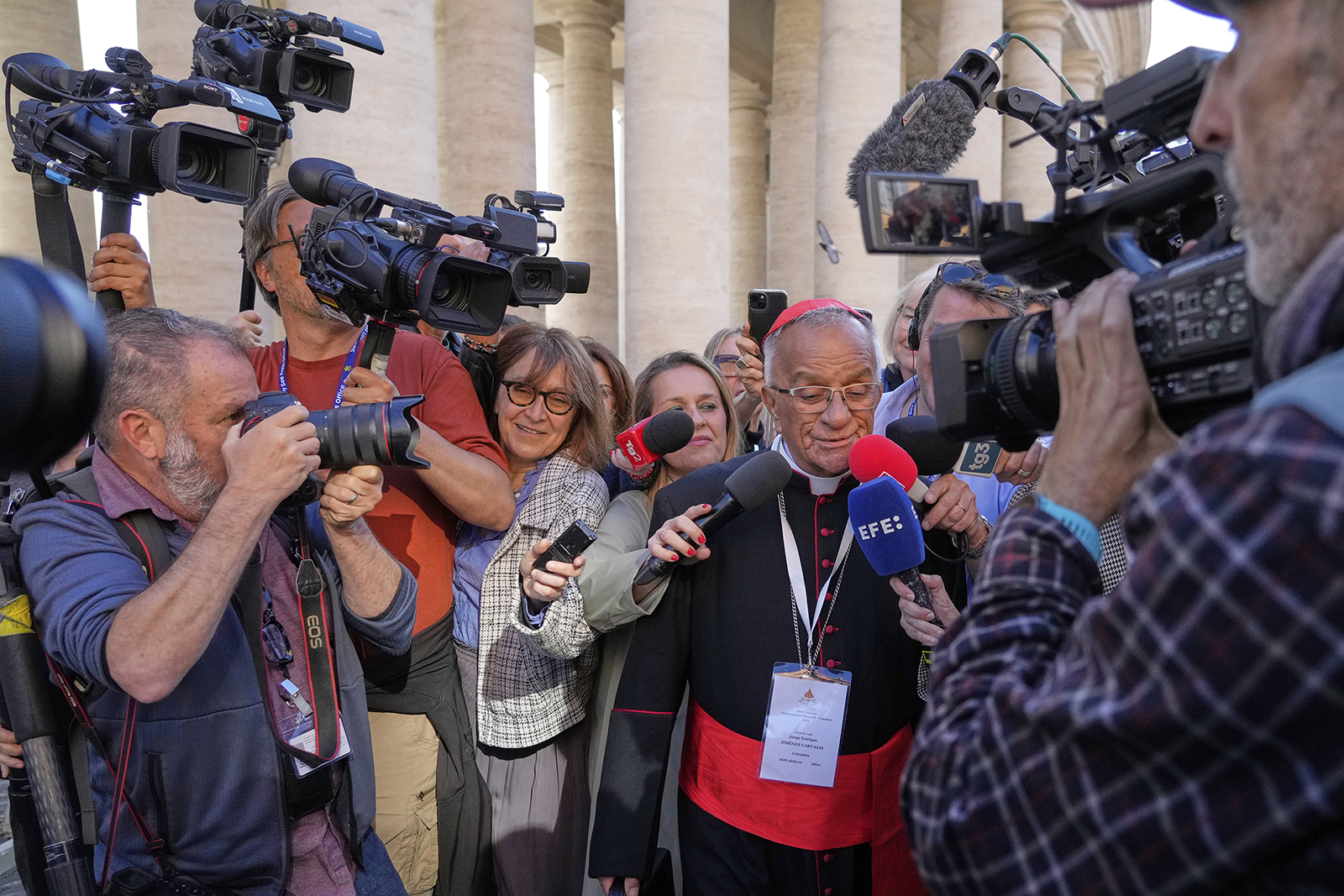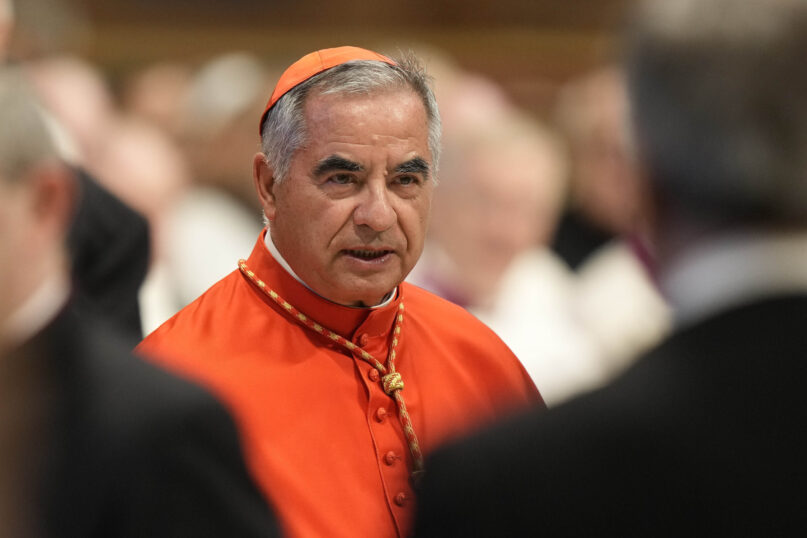
VATICAN CITY (RNS) — Cardinals said they believe the conclave scheduled to begin May 7 should not be long, with some claiming it will end as soon as two or three days after it starts.
Salvadoran Cardinal Gregorio Rosa Chávez told RNS on Wednesday (April 30) that he believes cardinals are ready to enter the conclave with specific names for the next pontiff in mind.
“Each one has his own opinion. Each one has his own list of candidates,” Rosa Chávez said after exiting the seventh meeting of cardinals ahead of the conclave at the Vatican, called general congregations.
“Maybe by Sunday or Saturday my candidate will be the next pope,” he said, adding he has a list of five candidates who have his support. At age 82, Rosa Chávez is too old to vote, however.
Cardinal Jean-Paul Vesco of Algiers (Algeria) and Cardinal Louis Raphaël Sako of the Chaldean Church in Baghdad (Iraq) also told journalists they expect the election of the next pontiff to happen soon, hinting that after getting to know one another, the prelates are converging on a list of candidates.
Some have voiced differing opinions, though, including German Cardinal Rainer Maria Woelki, who said even though he hopes for a short conclave, the outcome remains impossible to predict. Swedish Cardinal Anders Arborelius, who is considered a possible successor to Pope Francis, told Catholic News Service on Tuesday that the debate at the conclave remains open, with candidates from Asia and Africa representing a growing church.
Continuing Pope Francis’ legacy — addressing the Vatican’s financial situation and the continuing scourge of war in Ukraine and Gaza, among other issues — weighs heavily on the cardinals as they gather at the Vatican and in restaurants nearby. The seventh general congregation included 181 cardinals, with only 124 of the 133 voting cardinals present. The Vatican didn’t offer additional information about who the missing cardinals were or when they will arrive at the Vatican. However, Croatian Cardinal Vinko Puljić will attend the ceremony, despite health issues.
According to Vatican protocol, if a cardinal is too ill to attend the election in the Sistine Chapel, three cardinals called “infirmary” are randomly selected to escort the urn for votes to and from the residence of the sick cardinal. This process will likely delay the burning of the ballots, a step that informs faithful gathered in St. Peter’s Square whether a pontiff has been selected.
After a Mass in the morning on the first day of the conclave, cardinals will gather for a procession while reciting the litany of saints followed by a Latin chant, guiding them from the Paolina chapel at the Vatican’s Apostolic Palace to the Sistine Chapel, where the conclave will take place. From that moment on until a pope is chosen, the prelates will be entirely cut off from the world and not allowed to communicate with anyone outside the conclave.
The cardinals will stay at the Domus Santa Marta, the residence created by Pope John Paul II to house the cardinals during conclaves. It was also where Pope Francis lived during his papacy.
A statement issued by the general congregation on Wednesday confirmed Pope Francis waived limitations that had set the maximum number of cardinals to 120. The exceeding 13 cardinals will be housed in another residence next to the Domus Santa Marta, the Vatican said, but details of their accommodations have yet to be announced.
Cardinals on Wednesday also commented on Cardinal Angelo Becciu’s decision to withdraw from the conclave after being shown documents signed by Pope Francis stating his will that Becciu not participate.

Cardinal Angelo Becciu attends a consistory inside St. Peter’s Basilica, at the Vatican, on Aug. 27, 2022. (AP Photo/Andrew Medichini, File)
“Following Cardinal Becciu’s decision to not participate in the conclave, the Congregation of Cardinals expresses its appreciation for the gesture he has made and hopes that the competent judicial bodies will be able to definitively ascertain the facts,” a Vatican statement said.
Becciu was found guilty of fraud and embezzlement in a Vatican criminal trial in 2023, for his involvement in an opaque real estate investment using Vatican funds marked for charity.
During the cardinals’ meeting, those with expertise in the Vatican finances gave presentations outlining the financial status of the Catholic institution. The Vatican hasn’t published official budget reports since 2022, when it reported an over $94 million deficit. However, German Cardinal Reinhard Marx, coordinator of the Vatican Council for the Economy, outlined “challenges, issues and proposals from the perspective of sustainability,” according to the Vatican.
Additionally, the president of the commission overseeing the Vatican bank, officially known as the Institute for the Works of Religion, Austrian Cardinal Christoph Schönborn, offered a report. Cardinal Fernando Vergez, president of the Pontifical Commission for Vatican City State, spoke of the renovation works currently taking place in the city-state.
American Cardinal Kevin Farrell, who is charged with overseeing the conclave in his role as camerlengo, spoke of the activity of the Vatican investment committee he oversees. Finally, the papal almoner who dispensed Francis’ charitable works, Polish Cardinal Konrad Krajewski, explained how the Vatican money is being spent to support communities in need.
While it’s typical for cardinals to be briefed on the economic status of the Vatican before the conclave, the financial crisis the Catholic institution is experiencing, coupled with the desire to continue and reinforce Francis’ financial reforms, will likely weigh heavily on the conclave.
In the 14 speeches given by the cardinals, themes of polarization — which was described as a “wound” in the church and in society — and promoting dialogue and laypeople within the church were highlighted, as expressed in Francis’ vision for synodality.
Cardinals also asked for prayers from the faithful, given “the enormity of the task ahead,” the Wednesday statement said. Meanwhile, the Pontifical Missions Society USA began an initiative randomly assigning faithful to pray for a cardinal by visiting its website.
The cardinals will meet for the next congregation on Friday.
